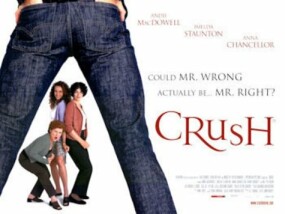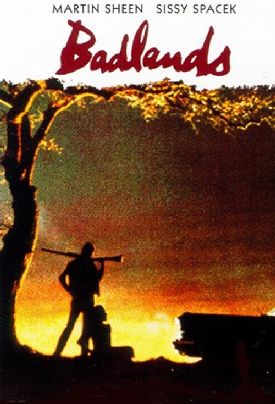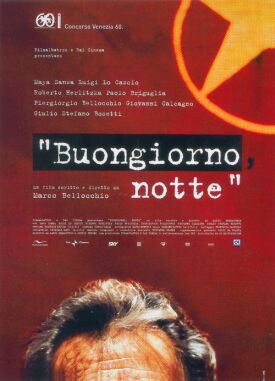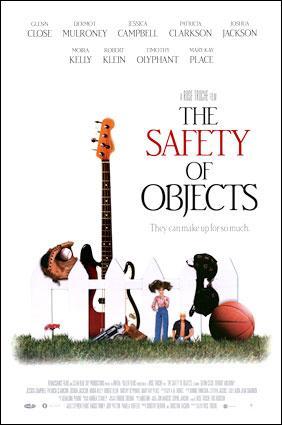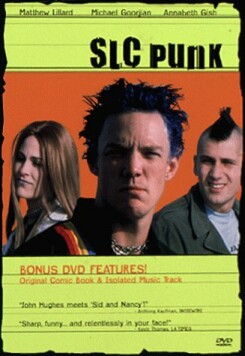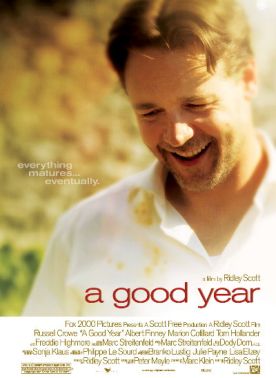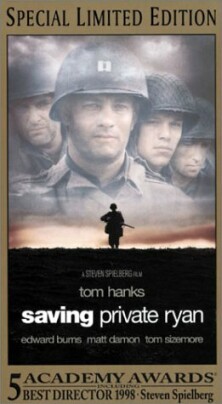Crush
It is a curiosity to myself how much I hated Crush. Molly Haskell might say that it was because I, or possibly my masculinity, felt threatened by the female solidarity of the movie’s three heroines. Writing in the “Arts and Leisure” section of the New York Times, Miss Haskell claims that “the film brings to the surface the dirty little secret of female solidarity that is rarely touched upon, not just in movies but in life. That is the rivalry, the jealousy, the ferocious fear of abandonment that underlie our support of one another. The fact that as we sit around giggling and gossiping and talking about men, urging each other into or out of this or that affair, on some level the last thing we really want is for one of us to find true bliss, ‘forsaking all others’ in the cruel and terrifying words of the marriage ceremony.”
I can’t quite see that there is much that is secret about this kind of jealousy, particularly among those disposed to think that the words “forsaking all others” are “cruel and terrifying.” But then why should its depiction in Crush, or that of the love which inspires it between one of the three women, Kate (Andie MacDowell), and Jed (Kenny Doughty), a much younger man, seem so revolting to me? Was it the fact that Andie MacDowell can’t act? But she couldn’t act in Sex, Lies and Videotape, Groundhog Day or Four Weddings and a Funeral either, and I liked all of those movies. Was it the terrible clichés of female bonding and bitching about men and eating chocolate and group hugs? That didn’t help, but I’ve seen a lot worse.
Maybe it is the fact that the movie is actually set up to be the cliché that it is — that the director, John McKay, doesn’t even try to do anything original with the central datum of the mise en scène, which is the tears and laughter and man-talk and drinking and smoking and shopping and chocolate-eating and more man-talk of the three friends who meet every week in their picturesque English market town in order to have a right old wallow in self-pity and mutual support for same. Maybe it is the fact that Miss Haskell, like Mr McKay not only loves the movie because of these things, and without any sense of how unfortunate they are as a collective moral posture, but in the reflexive, feminist-inspired belief that there is something transcendent or sublime about it.
The three friends are all 40ish and facing spinsterhood without much grace. Besides Kate, an American who has somehow, in spite of showing no evidence of academic accomplishment, managed to become headmistress of a local secondary school, they include Janine (Imelda Staunton), a high ranking WPC or woman police constable in the local CID, and Molly (Anna Chancellor), a doctor. Kate has never been married, but is being pursued by the local vicar, Gerald (Bill Paterson), who is a hearty, Outward Bound type whom she is resolutely unattracted to. Janine has a teenage son, either by an early marriage or an out-of-wedlock relationship, but is currently unattached. Molly is an embittered three-time loser in the marriage stakes who loves nothing better than ticking off the catalogue of the husbands who have done her wrong: Mr Schoolboy, Mr Gay and Mr Unspeakable Lying Bastard, otherwise unknown to us by name, though all three appear in brief cameos at a garden party when Molly suddenly and impulsively decides to become a part-time lesbian.
Kate meets Jed at a funeral. He is a 25-year old part time organist who works at the crematorium and who introduces himself to her as a former pupil. Before you can say Groundhog Day, the two of them are engaged in what appears to be less than ecstatic sex in the graveyard which apparently lies adjacent to the crematorium. Puns about his organ are many and tedious. Kate reports the experience to her two friends and there is much ribald jollity among them. Of course all assume that it is the kind of impulsive sexual deed to which “free women” of their age apparently consider themselves entitled, and that it can involve no real feeling on either side. When Janine tells Kate in response to her initial confession and with uncharacteristic cruelty that the deed has been a “touchingly obvious sign of your increasing desperation,” Kate snaps back that “I wasn’t looking for a life partner, Janine, just a quick tumble.”
Well, that’s all right then! But then, their whole shared female culture is designed to reinforce the notion that, as Molly says, men “are like bicycle pumps; they can only do one thing.” So much for half the human race! Nevertheless, Kate and Jed are said to be “in love,” and the two friends’ reactions move from amusement to horror. Both assume that the relationship must be broken off for the sake of their friend, and in an attempt to do this, they take her shopping in Paris, where they pick up three handsome Frenchmen, the handsomest of which (who owns “a sort of chateau” in the country) falls by agreement to Kate’s lot. Again, sexual intercourse seems to be considered a matter of course by both, though they have only met that day. But Kate can’t go through with it and immediately high-tails it back to Jed in England, who asks her to marry him on the spot.
Molly then makes it her mission to prevent the marriage, sure that young Jed can be no better than the horrible men in her own life. Tragedy ensues, and of course the three friends, driven asunder by the experience, must spend the rest of the picture getting back together and forming up into the tight, all-female support group of the beginning, now also called into service for the raising of the child that one of them has conceived along the way. Maybe what I hate is the attitude, perhaps even commoner in Britain now than in the U.S., that there is no shame in the kind of casual couplings that the women all assume are their lot in life — perhaps because eventually one might produce a peach of a guy like Jed
Actually, Jed is a horrid little oik of a boy, rude and boorish to Kate’s friends (though he is presumably a dream lover in bed), and any sensible person would agree with Molly that Kate should never even consider marrying him. In the end the infuriating thing about this picture is the same as the thing that I generally find infuriating about the movies, namely the absurd improbability of the people and the events. Maybe such a marriage as Jed and Kate contemplate could work one time in a thousand, but to ask us to suppose that this is the magic, lottery-winning example is to tell us that the deck has been stacked. Such an improbability can only have been insisted upon as a kind of apology for the sexual promiscuity which has led to it. And the celebration of that is, at least so far as the movies go, the biggest cliché of all.
Discover more from James Bowman
Subscribe to get the latest posts to your email.

